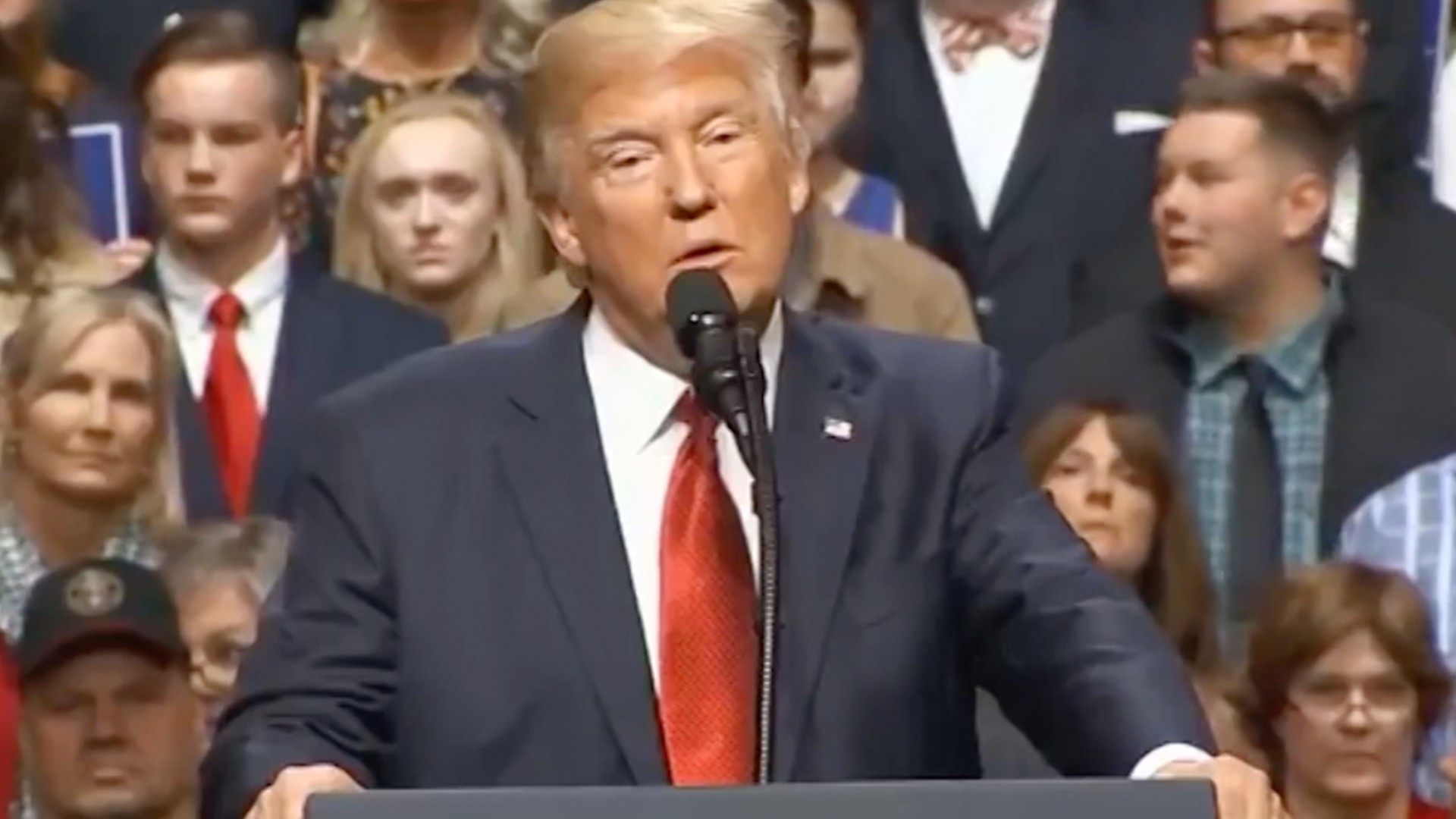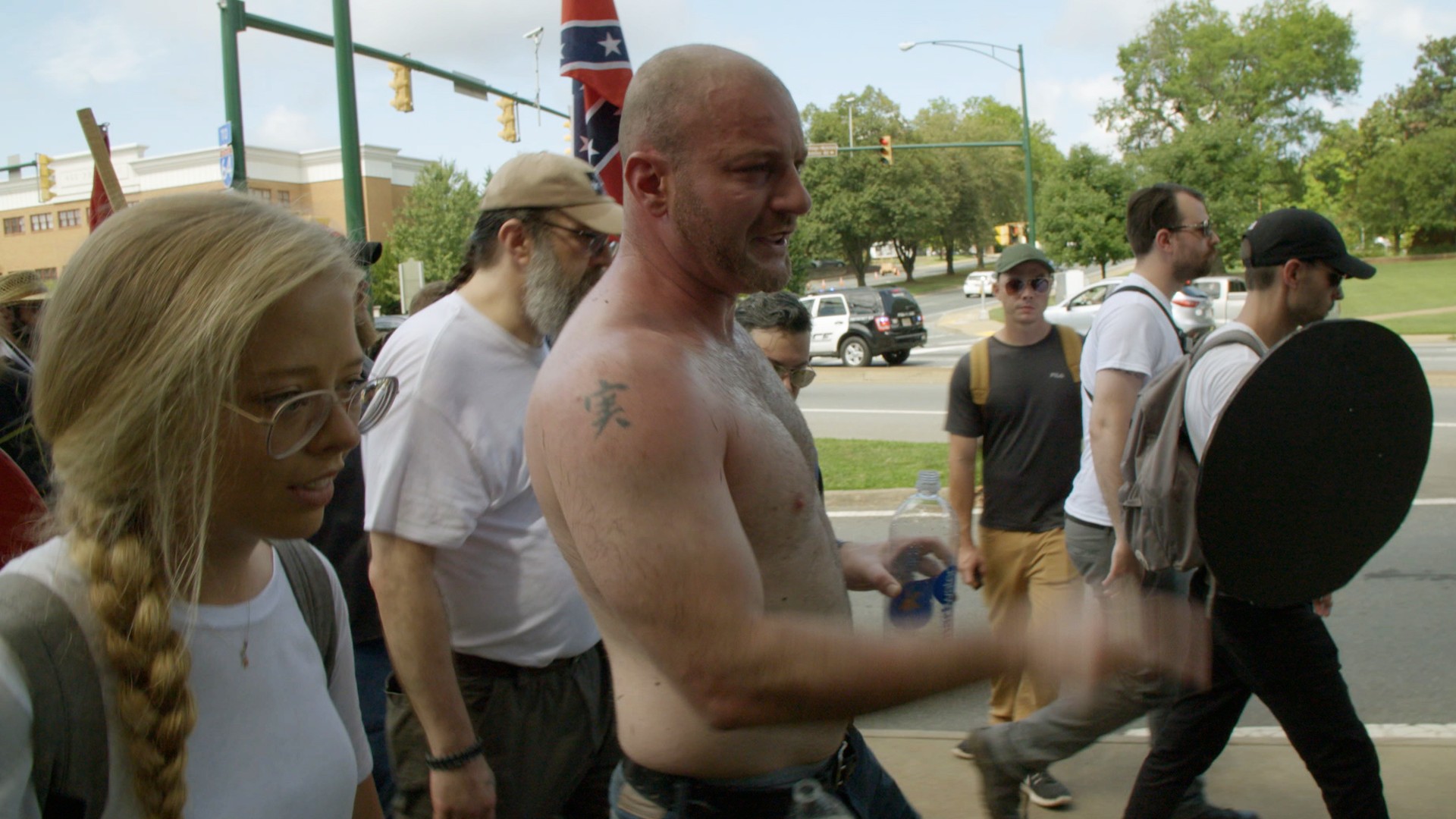Left: NICHOLAS KAMM/AFP/Getty Images Right: a marcher in Charlottesville, photo by Jessica Lehrman
Last week, Sebastian Gorka, a White House national security aide, appeared on television and dismissed the idea that acts of terrorism can be committed by "lone wolves.""There has never been a serious attack or a serious plot that was unconnected from ISIS or al Qaeda," Gorka said, arguing that even when terrorists weren't directly affiliated with Islamic terror groups, they were linked through ideology and tactics that spread online. "What we have to do now is not only destroy organizations like ISIS—which we are doing, they will be annihilated—but also delegitimize the ideology," he said. "So it will become as heinous and as rejected as fascism and Nazism is today."Gorka, who has been linked to far-right nationalist groups in his native Hungary, is often criticized by national security experts for his lack of bona fide credentials. But his most prominent job so far seems to be defending Donald Trump on TV, and advancing the White House's line on terrorism. That line? Terrorism is something perpetrated by Muslims and, occasionally, radical leftists. Even as white supremacists make more noise and become more brazen—as the deadly Unite the Right rally in Charlottesville this weekend demonstrated—the Trump administration seems committed to ignoring them, both in words and deed.That's the only sensible interpretation of the signals sent by the president and some of his subordinates. In the past year, as a candidate and now as president, Trump has sounded the alarm about any act of public violence committed by a Muslim while ignoring or being slow to react to news of violence against Muslims. Embarrassingly, in June, Trump called a mass shooting in Manila a "terror act," which was contradicted by local police. Last Tuesday, in the same MSNBC interview, Gorka said the White House had not commented on a Minnesota mosque bombing because of concerns about "fake hate crimes."So caution is apparently warranted whenever terrorism might be linked to radical right-wing Islamophobia, but not if it looks like a Muslim is the one doing the bombing or shooting.
Donald Trump isn't exactly reluctant to talk about Islamic terrorism:
Trump's response to Charlottesville, which was to condemn the "egregious display of hatred, bigotry and violence on many sides," fits this pattern nicely. Though the White House later clarified that his denunciation "of course that includes white supremacists, KKK, neo-Nazi and all extremist groups," the slowness of that response—and the fact that it didn't come from Trump personally—made the president seem downright soft on racism. (Some white supremacists were heartened by Trump's lack of condemnation.)The president's reticence to quickly and forcefully denounce white nationalism drew comparison to Barack Obama's long-standing refusal to say the words "radical Islamic terrorism." Though he was criticized by conservatives (including Trump), Obama's stance had a logic to it at least—he believed that singling out Islam, even "radical" Islam, would lead to an uptick in bigotry against Muslims and make tensions worse.There are no plausible potentially negative consequences to explicitly calling out neo-Nazis in Charlottesville. Though many on the right are willing to tolerate racist dog-whistles (few Republicans objected to Trump's "birther" allegations against Obama, for instance), the line is always drawn at overt white supremacy. Ted Cruz, the Senate's most flamboyant conservative, called the car attack that killed a protester in Charlottesville a "grotesque act of domestic terrorism." Utah senator Orrin Hatch was equally forceful in attacking Nazism. So why didn't Trump join that rhetoric?One explanation is that Trump is simply bad at the routine business of sounding presidential. But the case can also be made that Trump's initial statement serves a deliberate political purpose. If "many sides" are responsible for hate and violence, the solution is patriotism, unity, law and order. If the problem is that white supremacists are newly emboldened—well, that's not a problem the White House appears to want to address.From 2008 to 2016, there were 63 cases of Islamist-inspired terrorism, 115 cases of terrorism linked to right-wing rhetoric, and just 19 cases of left-wing-linked terrorism, according to an analysis by Reveal and the Investigative Fund. Yet at least as of February, the Trump administration was reportedly considering changing the focus of the Department of Homeland Security's Countering Violent Extremism program to concentrate solely on Muslims and Islamic extremism, not right-wing actors.Fears of Islamic terror were also a stated reason for Trump's "travel ban" that would bar citizens of several majority-Muslim countries from entering the US. In February, Trump told Congress that "according to data provided by the Department of Justice, the vast majority of individuals convicted of terrorism or terrorism-related offenses since 9/11 came here from outside of our country"—a statement so at odds with available statistics on terror that the national security journalist Benjamin Wittes believes Trump straight-up lied and is suing the Department of Justice in order to see if that "data" exists.The administration clearly believes that Islamic extremism is a serious concern—so serious that it has taken aggressive and possibly unconstitutional steps to counteract it. Surrogates like Gorka go on TV to blast "radical Islam." At the National Security Council, a staffer wrote an unhinged memo connecting the Muslim Brotherhood to "cultural Marxism"—and though the memo's author was fired by national security adviser H.R. McMaster, Trump was reportedly "furious" about the firing. That's how deeply Islamophobia is engrained in the White House.

Since Trump's election, white supremacists and others linked to the far right have publicly celebrated his victory and marched in the streets from Berkeley to Charlottesville. Hate crimes appear to have spiked in the days after the election; some of these acts were even committed in Trump's name. The Department of Justice is investigating the Charlottesville car attack, yet there is little apparent effort to counter this larger wave of White Rage—certainly nothing on the scale of the paranoid campaign against radical Islam.Charlottesville demonstrated how ugly the fringes of right-wing politics can be, and how eager some of its acolytes are to commit violence. But Trump's response—or non-response—was nothing new. (By Monday morning, Trump was back to tweeting about his usual beefs over trade.) If this rising tide of outright white supremacy is beaten back successfully and another Charlottesville is prevented, it will be no thanks to the White House, nor the man inside it.Follow Harry Cheadle on Twitter.
Advertisement
Advertisement
Donald Trump isn't exactly reluctant to talk about Islamic terrorism:

Trump's response to Charlottesville, which was to condemn the "egregious display of hatred, bigotry and violence on many sides," fits this pattern nicely. Though the White House later clarified that his denunciation "of course that includes white supremacists, KKK, neo-Nazi and all extremist groups," the slowness of that response—and the fact that it didn't come from Trump personally—made the president seem downright soft on racism. (Some white supremacists were heartened by Trump's lack of condemnation.)The president's reticence to quickly and forcefully denounce white nationalism drew comparison to Barack Obama's long-standing refusal to say the words "radical Islamic terrorism." Though he was criticized by conservatives (including Trump), Obama's stance had a logic to it at least—he believed that singling out Islam, even "radical" Islam, would lead to an uptick in bigotry against Muslims and make tensions worse.There are no plausible potentially negative consequences to explicitly calling out neo-Nazis in Charlottesville. Though many on the right are willing to tolerate racist dog-whistles (few Republicans objected to Trump's "birther" allegations against Obama, for instance), the line is always drawn at overt white supremacy. Ted Cruz, the Senate's most flamboyant conservative, called the car attack that killed a protester in Charlottesville a "grotesque act of domestic terrorism." Utah senator Orrin Hatch was equally forceful in attacking Nazism. So why didn't Trump join that rhetoric?
Advertisement
Advertisement

Since Trump's election, white supremacists and others linked to the far right have publicly celebrated his victory and marched in the streets from Berkeley to Charlottesville. Hate crimes appear to have spiked in the days after the election; some of these acts were even committed in Trump's name. The Department of Justice is investigating the Charlottesville car attack, yet there is little apparent effort to counter this larger wave of White Rage—certainly nothing on the scale of the paranoid campaign against radical Islam.Charlottesville demonstrated how ugly the fringes of right-wing politics can be, and how eager some of its acolytes are to commit violence. But Trump's response—or non-response—was nothing new. (By Monday morning, Trump was back to tweeting about his usual beefs over trade.) If this rising tide of outright white supremacy is beaten back successfully and another Charlottesville is prevented, it will be no thanks to the White House, nor the man inside it.Follow Harry Cheadle on Twitter.
